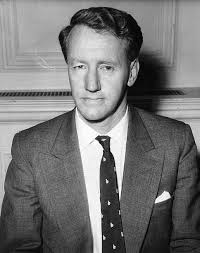DOCTOR OF PHILOSOPHY (HONORIS CAUSA)
 Ian Douglas Smith was born at Selukwe, Rhodesia, on 8 April 1919. He completed his school education in Gwelo where he was a noted athlete and sports captain, and had the distinction of being made Head Prefect in 1937.
Ian Douglas Smith was born at Selukwe, Rhodesia, on 8 April 1919. He completed his school education in Gwelo where he was a noted athlete and sports captain, and had the distinction of being made Head Prefect in 1937.
He interrupted his university studies to join the Royal Air Force in 1941. Serving in the Western Desert, he was seriously injured in an aircraft crash. However, displaying great determination, he recovered and within a few months had returned to flying. On a mission over Northern Italy in mid-1943, the Spitfire he was flying sustained considerable damage, forcing him to bail out. With characteristic resourcefulness, he joined the Italian partisans until he was able to make contact with the Allied forces. He continued serving in the Royal Air Force until the end of the war.
Having completed his studies at Rhodes University, he turned to farming and soon assumed public. responsibilities, being elected to the Southern Rhodesia Legislative Assembly in 1948 and to the Federal Parliament in 1953. By 1958 he had become Chief Government Whip to Sir Roy Welensky. In 1961 he resigned from the United Federal Party but remained in Parliament as an Independent. In the following year he was one of the founder members of the Rhodesian Front and on 14 April 1964 Ian Smith became Prime Minister of Rhodesia.
The momentous date of 11 November 1965 marks the beginning of a new volume in the history of Rhodesia as a fully independent sovereign state and indeed in the history of Southern Africa as a whole. The declaration of independence necessitated by the break· down of the London talks was the first courageous step on a long and previously uncharted course calling for great strength of purpose and fortitude beyond normal endurance.
Since that time Mr Smith's remarkable statesmanship has been amply demonstrated on all occasions and particularly on 25 November 1977 when he announced that leaders of the black political parties had been invited to enter into constitutional negotiations with the Government, the latter being prepared to conduct such negotiations on the understanding that, if its requirements were met, it would accept the principle of majority rule, based on adult suffrage.
The high esteem and confidence in which Mr Smith is held by his compatriots has been further demonstrated by the overwhelmingly favourable vote which he received from the white voters on 31 January 1979 in the referendum on the proposed new constitutional dispensation for Rhodesia.
It isn’t possible here to record even in part the annals of Rhodesia on facing the constraints of sanctions, the barrage of hostile propaganda and deliberate international misrepresentation, as well as the senseless atrocities of terrorism, up to the present time. But what is certain is that when this volume of the history of the Rhodesian peoples comes to be recorded each page shall bear witness to the remarkable qualities of its courageous Prime Minister.
He has set an aspiring example of unswerving devotion to duty, true statesmanship maintained with unassuming dignity in the face of relentless and scurrilous attacks and, above all, of personal self-sacrifice in continuing his stand for the maintenance of law and order, peaceful change for his peoples, dialogue in good faith ' and respect for human life.
It is indeed a privilege for the Council and the Senate of the University of Port Elizabeth to honour Ian Douglas Smith in this way.